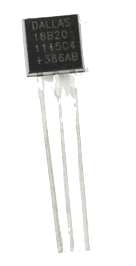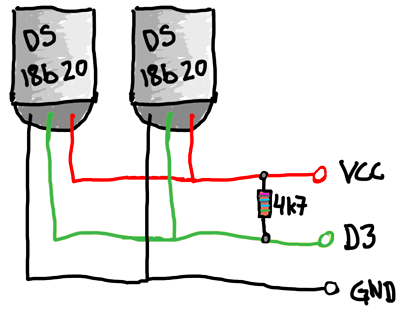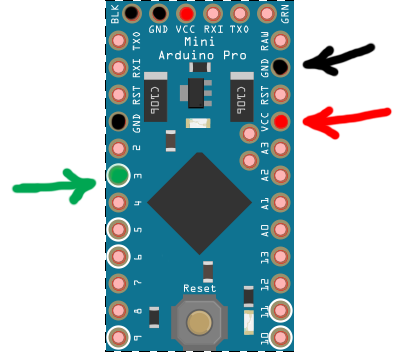 For temperature measurements we've selected the standard Dallas DS18B20.
For temperature measurements we've selected the standard Dallas DS18B20.
It's accurate, inexpensive and you can connect many of them in parallel without using more than one digital input on the Arduino board.
They come in several variants: probe, individual, brick and a waterproof version.
You will also need a small pull-up resistor to make the circuit work. It is usually around 4,7kOhm.

Wiring Things Up
Start by connecting the radio module.


| Sensor | Arduino | Comment |
|---|---|---|
| GND (left pin) | GND | Marked black |
| VCC (right pin) | VCC (3.0-5.5V) | Marked red |
| DQ (middle pin) | Digital pin 3 | Marked green |
Mount a 4.7kOhm (4k7) resistor between VCC and Digital pin 3
Example
This example uses a modified version of the external DallasTemperature library, which is included in the MySensors external examples. Please install it and restart the Arduino IDE before trying to compile.
/**
* The MySensors Arduino library handles the wireless radio link and protocol
* between your home built sensors/actuators and HA controller of choice.
* The sensors forms a self healing radio network with optional repeaters. Each
* repeater and gateway builds a routing tables in EEPROM which keeps track of the
* network topology allowing messages to be routed to nodes.
*
* Created by Henrik Ekblad <[email protected]>
* Copyright (C) 2013-2015 Sensnology AB
* Full contributor list: https://github.com/mysensors/Arduino/graphs/contributors
*
* Documentation: http://www.mysensors.org
* Support Forum: http://forum.mysensors.org
*
* This program is free software; you can redistribute it and/or
* modify it under the terms of the GNU General Public License
* version 2 as published by the Free Software Foundation.
*
*******************************
*
* DESCRIPTION
*
* Example sketch showing how to send in DS1820B OneWire temperature readings back to the controller
* http://www.mysensors.org/build/temp
*/
// Enable debug prints to serial monitor
//#define MY_DEBUG
// Enable and select radio type attached
#define MY_RADIO_RF24
//#define MY_RADIO_RFM69
#include <MySensors.h>
#include <DallasTemperature.h>
#include <OneWire.h>
#define COMPARE_TEMP 1 // Send temperature only if changed? 1 = Yes 0 = No
#define ONE_WIRE_BUS 3 // Pin where dallase sensor is connected
#define MAX_ATTACHED_DS18B20 16
unsigned long SLEEP_TIME = 30000; // Sleep time between reads (in milliseconds)
OneWire oneWire(ONE_WIRE_BUS); // Setup a oneWire instance to communicate with any OneWire devices (not just Maxim/Dallas temperature ICs)
DallasTemperature sensors(&oneWire); // Pass the oneWire reference to Dallas Temperature.
float lastTemperature[MAX_ATTACHED_DS18B20];
int numSensors=0;
bool receivedConfig = false;
bool metric = true;
// Initialize temperature message
MyMessage msg(0,V_TEMP);
void before()
{
// Startup up the OneWire library
sensors.begin();
}
void setup()
{
// requestTemperatures() will not block current thread
sensors.setWaitForConversion(false);
}
void presentation() {
// Send the sketch version information to the gateway and Controller
sendSketchInfo("Temperature Sensor", "1.1");
// Fetch the number of attached temperature sensors
numSensors = sensors.getDeviceCount();
// Present all sensors to controller
for (int i=0; i<numSensors && i<MAX_ATTACHED_DS18B20; i++) {
present(i, S_TEMP);
}
}
void loop()
{
// Fetch temperatures from Dallas sensors
sensors.requestTemperatures();
// query conversion time and sleep until conversion completed
int16_t conversionTime = sensors.millisToWaitForConversion(sensors.getResolution());
// sleep() call can be replaced by wait() call if node need to process incoming messages (or if node is repeater)
sleep(conversionTime);
// Read temperatures and send them to controller
for (int i=0; i<numSensors && i<MAX_ATTACHED_DS18B20; i++) {
// Fetch and round temperature to one decimal
float temperature = static_cast<float>(static_cast<int>((getControllerConfig().isMetric?sensors.getTempCByIndex(i):sensors.getTempFByIndex(i)) * 10.)) / 10.;
// Only send data if temperature has changed and no error
#if COMPARE_TEMP == 1
if (lastTemperature[i] != temperature && temperature != -127.00 && temperature != 85.00) {
#else
if (temperature != -127.00 && temperature != 85.00) {
#endif
// Send in the new temperature
send(msg.setSensor(i).set(temperature,1));
// Save new temperatures for next compare
lastTemperature[i]=temperature;
}
}
sleep(SLEEP_TIME);
}
